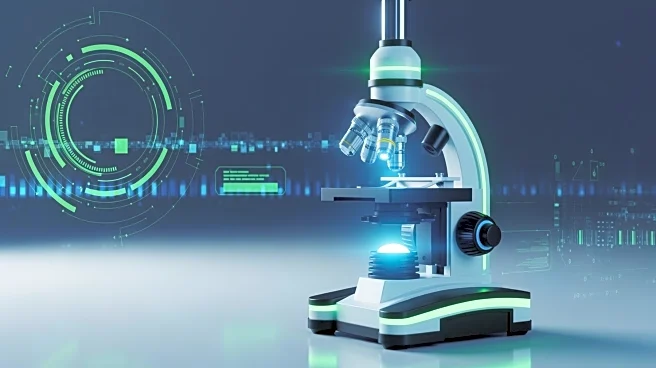What's Happening?
A recent study has evaluated the use of ChatGPT in generating reports for automated microbial identification and antibiotic susceptibility testing systems in clinical microbiology. The research focused on enhancing ChatGPT's capabilities through a training
methodology based on the latest CLSI guidelines and clinical workflows. The study found that ChatGPT significantly improved report accuracy, aiding healthcare professionals in making better-informed clinical decisions. The application of ChatGPT demonstrated improved ability to provide structured and clinically relevant interpretations across various challenging scenarios, such as enzyme-mediated resistance mechanisms and novel resistance patterns. This highlights the potential of advanced language models to streamline laboratory processes and support healthcare professionals in diagnostic tasks.
Why It's Important?
The integration of ChatGPT into clinical microbiology practices could have significant implications for the healthcare industry. By improving the accuracy of diagnostic reports, ChatGPT can enhance clinical decision-making, potentially leading to better patient outcomes. This advancement may also reduce the workload on clinical microbiologists, allowing them to focus on more complex tasks. The use of AI in healthcare settings represents a transformative shift, offering the potential for increased efficiency and reliability in diagnostic processes. As healthcare systems continue to face challenges such as resource limitations and the need for rapid advancements in technology, tools like ChatGPT could play a crucial role in addressing these issues.
What's Next?
Future studies are expected to validate the approach of using ChatGPT across a broader range of geographic and socioeconomic contexts to ensure its generalizability and scalability in diverse clinical settings. There is potential for developing a specialized ChatGPT microbiology knowledge base, incorporating continuously updated and verified information to further assist clinical microbiologists. Additionally, collaborations with international institutions could extend the applicability of ChatGPT-assisted tools globally, enhancing their robustness and adoption in various healthcare environments.
Beyond the Headlines
The study also highlights the limitations of ISO15189 certification in clinical microbiology, suggesting that certification alone may not significantly enhance standards due to the complex nature of the discipline. The variability in resources and geographic differences in pathogen prevalence further complicate standardization efforts. Addressing these disparities may require tailored approaches that consider regional differences in resources, training, and local epidemiology. The development of AI-assisted tools like ChatGPT could help mitigate these challenges by providing a more equitable distribution of knowledge and resources.















